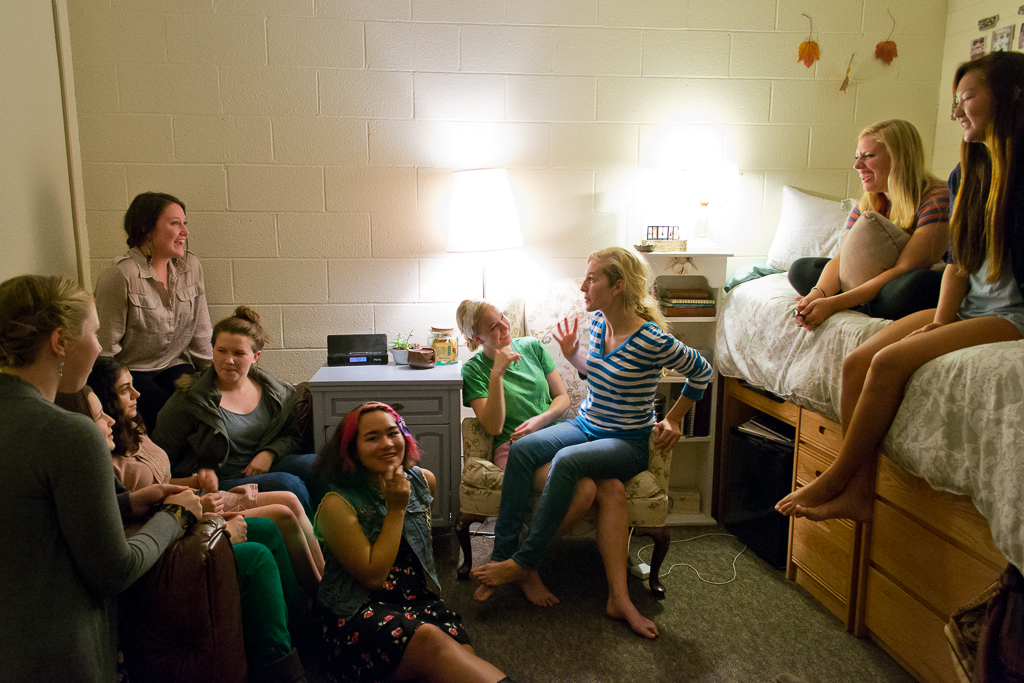
Maddie Gettings, currently a junior, (upper left) spends time with some of the freshmen girls on her floor last year. This week, The Chimes staff argues that Resident Life offers a better alternative to SOS week by incorporating incoming students into a long-term community rather than the short-term week that SOS provides. | Ashleigh Fox/THE CHIMES [file photo]
Name? Major? Hometown? Dorm? These four questions define many freshmen’s first encounters when arriving on campus, particularly during SOS week. This opening juggernaut of social interaction often makes or breaks an incoming student’s initial college experience. Friendships are frequently formed or forgotten on the basis of commonalities rather than personalities. This can lead to a mirage of “microwaved” relationships that rarely stand the test of time. One can only ask the question of whom SOS week most benefits: the incoming students or the SOS leaders themselves?
When freshmen arrive at Biola, the first week seems a lot like summer camp. They witness SOS leaders perform skits before going on scavenger hunts around the Brea mall and constructing their feelings out of pipe cleaners. They are welcomed multiple times and assured the best part of Biola is the community — an assertion with which we agree. At times, however, it is as though the lasting community being fostered during Opening Week is between the SOS leaders themselves, rather than between students. Leaders train together for weeks during the end of the school year and over the summer and even perform at Mock Rock together. It seems the goal of SOS — creating instant friends after a week’s worth of interaction — mostly benefits the staff because they have more than one week to form lasting relationships.
We are not condemning the intent of SOS week or the leaders who sacrifice a lot of their time to make the week go smoothly. Rather, we would like to point out a question that ought to be addressed: Is there a more natural way to connect incoming students and integrate them into communities that will last them much longer? The answer is quite simple: residence life. With so many freshmen becoming part of a floor community, it would be wise to focus on strengthening these bonds from the offset. The roles fulfilled by the SOS leaders can be performed by the resident assistants and commuter staff.
Of course, there are several ways the SOS program benefits both freshmen and their leaders. SOS leaders are given an opportunity to practice taking responsibility for a large group of people, whether that means organizing fun events like beach day or explaining how to open Biola’s strange mailboxes.
For new freshmen, orientation week can serve as an easy way to learn the ropes of Biola. It is worthwhile to take a day or two to help new students familiarize themselves with Biola’s campus so they can find their classes on the first day of school, figure out where and when chapel is, and avoid the embarrassing mistake of using a tray in the Caf. Finally, while most students don’t end up being best friends with anyone from their SOS group, it can and does happen.
For the most part, however, this is not the case. We must look at ways to incorporate more people into the opening week in order to foster relationships lasting longer than just Serve Day and Academic Commencement Dinner.
Where is the harm in grouping incoming students with their neighbors? The first month of floor integration could be easily established within that first week. People would no longer know their orientation group members as the people they saw for that one week only to never hear from them again. Instead, the first week becomes a welcome to an already established community, one that will last much longer.
Most incoming students will spend an entire year surrounded by a specific group of people — not their SOS groups, but their floormates and commuter friends. While there are some rare occurrences where SOS groups stay close over time, more often than not the groups slowly dissolve as some people feel uncomfortably obligated to stay in contact while others don’t. The focal point needs to get back to the students.







